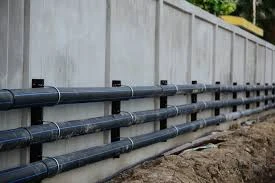Dec . 18, 2024 10:10 Back to list
pvc water supply pipe
The Role of PVC Water Supply Pipes in Modern Infrastructure
In today's world, the efficient delivery of water is critical to public health, sanitation, and overall quality of life. Among the materials used for water supply systems, Polyvinyl Chloride (PVC) pipes have gained significant popularity due to their durability, cost-effectiveness, and ease of installation. This article explores the various attributes of PVC pipes, their applications, and their impact on water supply systems.
Advantages of PVC Pipes
One of the primary advantages of PVC pipes is their resistance to corrosion and degradation. Unlike traditional materials like metal or concrete, PVC is not susceptible to rust, which means it maintains its structural integrity over time. This characteristic is particularly important in water supply applications, where the presence of water can lead to the deterioration of other materials.
Moreover, PVC pipes are lightweight, making them easier to handle and install compared to heavier alternatives. This property significantly reduces labor costs and installation time, which is a crucial factor for municipal projects. Their flexibility also allows them to be used in various environments, adapting to the conditions of the terrain without compromising the system's performance.
Another significant benefit of PVC water supply pipes is their longevity. With a lifespan that can exceed 50 years when properly installed, these pipes require minimal maintenance, further lowering long-term costs for municipalities and water providers. Their smooth inner surface reduces friction, facilitating better flow rates and decreasing the energy required for water movement.
Environmental Impact
PVC is often criticized for its production process and the potential environmental impacts associated with it. However, advancements in manufacturing technology and recycling processes have improved the sustainability of PVC pipes. Many manufacturers now produce pipes that incorporate recycled materials, reducing the overall carbon footprint associated with their production.
Furthermore, PVC pipes can be recycled at the end of their life cycle, making them a more sustainable choice compared to some other materials. The ability to reuse PVC results in less waste and contributes to a circular economy in the construction and plumbing sectors.
pvc water supply pipe

Applications in Water Supply
PVC pipes find extensive applications in various water supply systems, including residential plumbing, irrigation, and municipal water distribution networks. Their versatility allows them to be used in pressurized systems, gravity-fed systems, and even in underground installations.
For residential use, PVC pipes are often employed for supply lines and drainage systems. Their non-toxic nature makes them safe for potable water applications, ensuring that drinking water remains uncontaminated. This feature is particularly important as communities seek to improve their overall water quality.
In agricultural applications, PVC pipes play a crucial role in irrigation systems. Farmers rely on them to deliver water efficiently to crops, which is essential for maintaining yields in an era of changing climate conditions. The effective management of water resources through PVC piping systems can lead to increased agricultural productivity while conserving water.
Challenges and Considerations
Despite their advantages, there are certain challenges associated with the use of PVC pipes. For instance, their susceptibility to UV damage means that they require protection when installed above ground. Additionally, in extreme temperature conditions, PVC can become brittle, necessitating careful consideration in regions with fluctuating climates.
Contractors and engineers must also adhere to local codes and regulations regarding the use of PVC in water supply systems. Understanding soil conditions, chemical exposure, and service temperature related to the specific application is critical for ensuring the longevity and efficiency of PVC installations.
Conclusion
In conclusion, PVC water supply pipes are a vital component of modern infrastructure, offering numerous benefits that enhance the efficiency and reliability of water delivery systems. Their resistance to corrosion, ease of installation, and longevity make them an appealing choice for a variety of applications. As sustainability becomes increasingly important in construction and plumbing, the ability to recycle PVC pipes further elevates their status as a responsible choice for modern water supply needs. With ongoing advancements in materials science, PVC pipes are set to play a crucial role in shaping the future of water infrastructure.
-
High-Precision PVC Rigid Sheets for Vacuum Forming | AI-Optimized
NewsAug.05,2025
-
Durable PVC-M Water Supply Pipes | 60-Year Life
NewsAug.04,2025
-
Premium HDPE Water Supply Pipes: Durable & Leak-Proof
NewsAug.03,2025
-
Premium PVC-M Water Supply Pipe - Durable & Efficient
NewsAug.02,2025
-
HDPE Drainage & Irrigation Pipe - Durable, Efficient Solutions
NewsAug.01,2025
-
Premium PVC Transparent Pipe: Durable & Clear Solutions
NewsJul.31,2025

